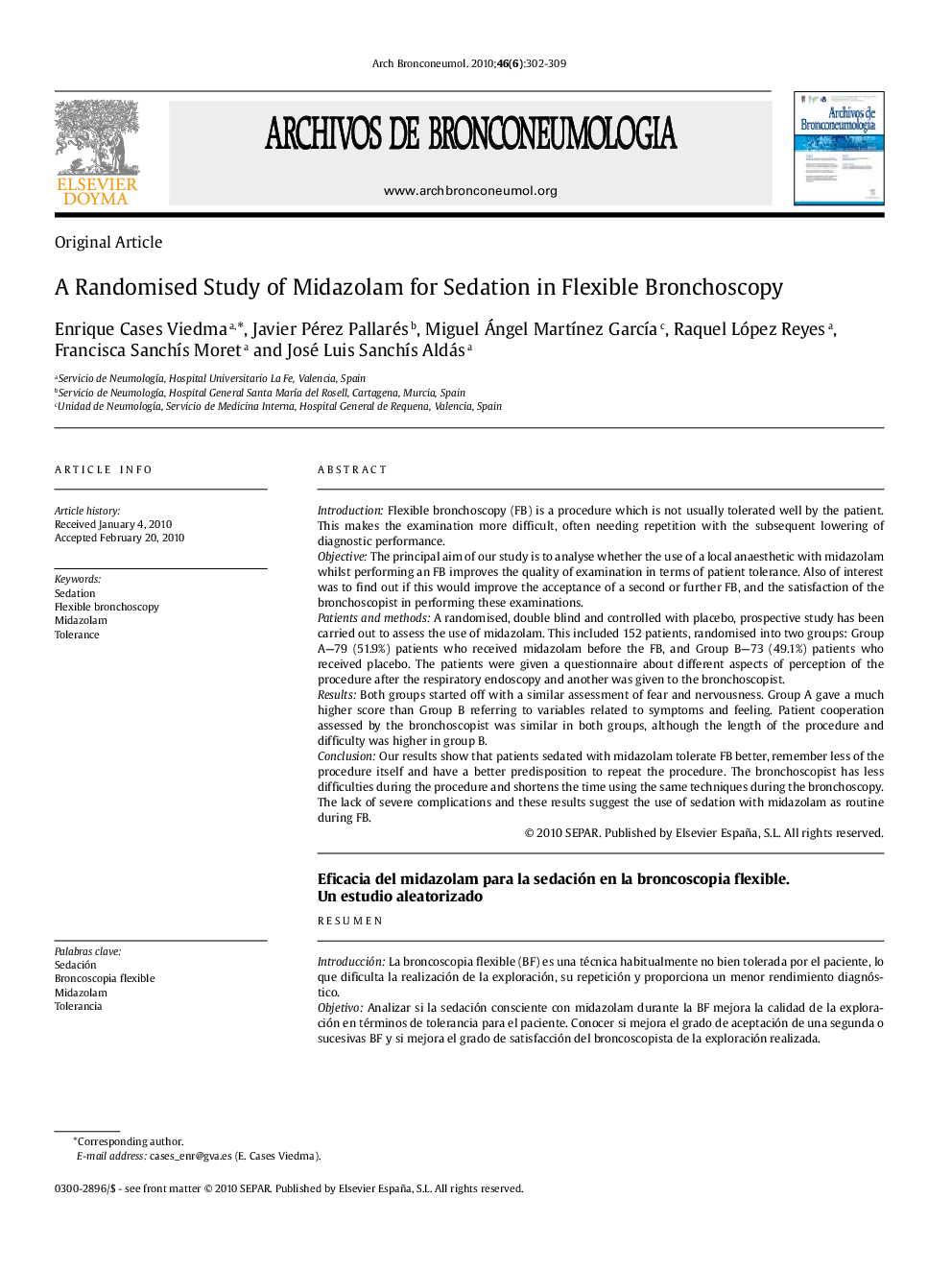| Article ID | Journal | Published Year | Pages | File Type |
|---|---|---|---|---|
| 4206013 | Archivos de Bronconeumología (English Edition) | 2010 | 8 Pages |
IntroductionFlexible bronchoscopy (FB) is a procedure which is not usually tolerated well by the patient. This makes the examination more difficult, often needing repetition with the subsequent lowering of diagnostic performance.ObjectiveThe principal aim of our study is to analyse whether the use of a local anaesthetic with midazolam whilst performing an FB improves the quality of examination in terms of patient tolerance. Also of interest was to find out if this would improve the acceptance of a second or further FB, and the satisfaction of the bronchoscopist in performing these examinations.Patients and methodsA randomised, double blind and controlled with placebo, prospective study has been carried out to assess the use of midazolam. This included 152 patients, randomised into two groups: Group A—79 (51.9%) patients who received midazolam before the FB, and Group B—73 (49.1%) patients who received placebo. The patients were given a questionnaire about different aspects of perception of the procedure after the respiratory endoscopy and another was given to the bronchoscopist.ResultsBoth groups started off with a similar assessment of fear and nervousness. Group A gave a much higher score than Group B referring to variables related to symptoms and feeling. Patient cooperation assessed by the bronchoscopist was similar in both groups, although the length of the procedure and difficulty was higher in group B.ConclusionOur results show that patients sedated with midazolam tolerate FB better, remember less of the procedure itself and have a better predisposition to repeat the procedure. The bronchoscopist has less difficulties during the procedure and shortens the time using the same techniques during the bronchoscopy. The lack of severe complications and these results suggest the use of sedation with midazolam as routine during FB.
ResumenIntroducciónLa broncoscopia flexible (BF) es una técnica habitualmente no bien tolerada por el paciente, lo que dificulta la realización de la exploración, su repetición y proporciona un menor rendimiento diagnóstico.ObjetivoAnalizar si la sedación consciente con midazolam durante la BF mejora la calidad de la exploración en términos de tolerancia para el paciente. Conocer si mejora el grado de aceptación de una segunda o sucesivas BF y si mejora el grado de satisfacción del broncoscopista de la exploración realizada.Pacientes y métodosSe ha realizado un estudio prospectivo, aleatorizado, doble ciego y controlado con placebo a recibir midazolam. Se incluyó a 152 pacientes aleatorizados en 2 grupos: grupo A de 79 pacientes (51,9%) que recibieron midazolam y grupo B de 73 pacientes (49,1%) que recibieron placebo. Los pacientes contestaron tras la BF un cuestionario sobre diferentes aspectos de la percepción de la exploración y el broncoscopista contestó otro.ResultadosAmbos grupos comenzaron con una valoración de miedo y nerviosismo muy similar. El grupo A mostró una valoración muy superior al grupo B en lo referente a las variables relacionadas con los síntomas y las sensaciones. La colaboración del paciente fue similar en ambos grupos, aunque la duración de la prueba y la dificultad fueron mayores en el grupo B.ConclusionesNuestros resultados demuestran que la BF en los pacientes sedados con midazolam se tolera mejor, tienen menos recuerdos y refieren una mejor predisposición a repetir la exploración. El broncoscopista encuentra menos dificultad durante su realización y acorta su duración al realizar las mismas técnicas durante la broncoscopia. La ausencia de complicaciones graves y estos resultados aconsejan el uso de sedación con midazolam de forma habitual durante la BF en pacientes sin contraindicaciones.
